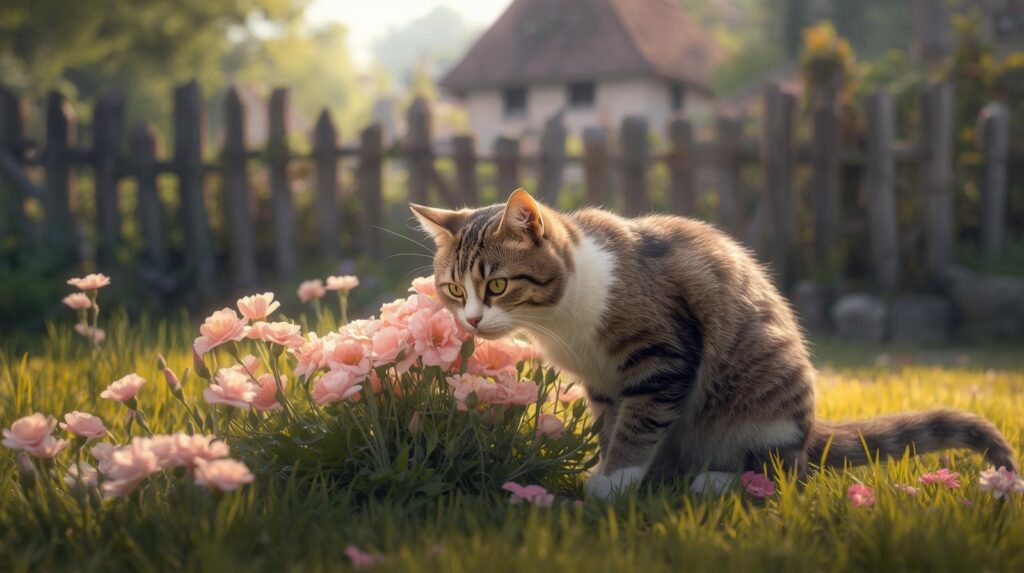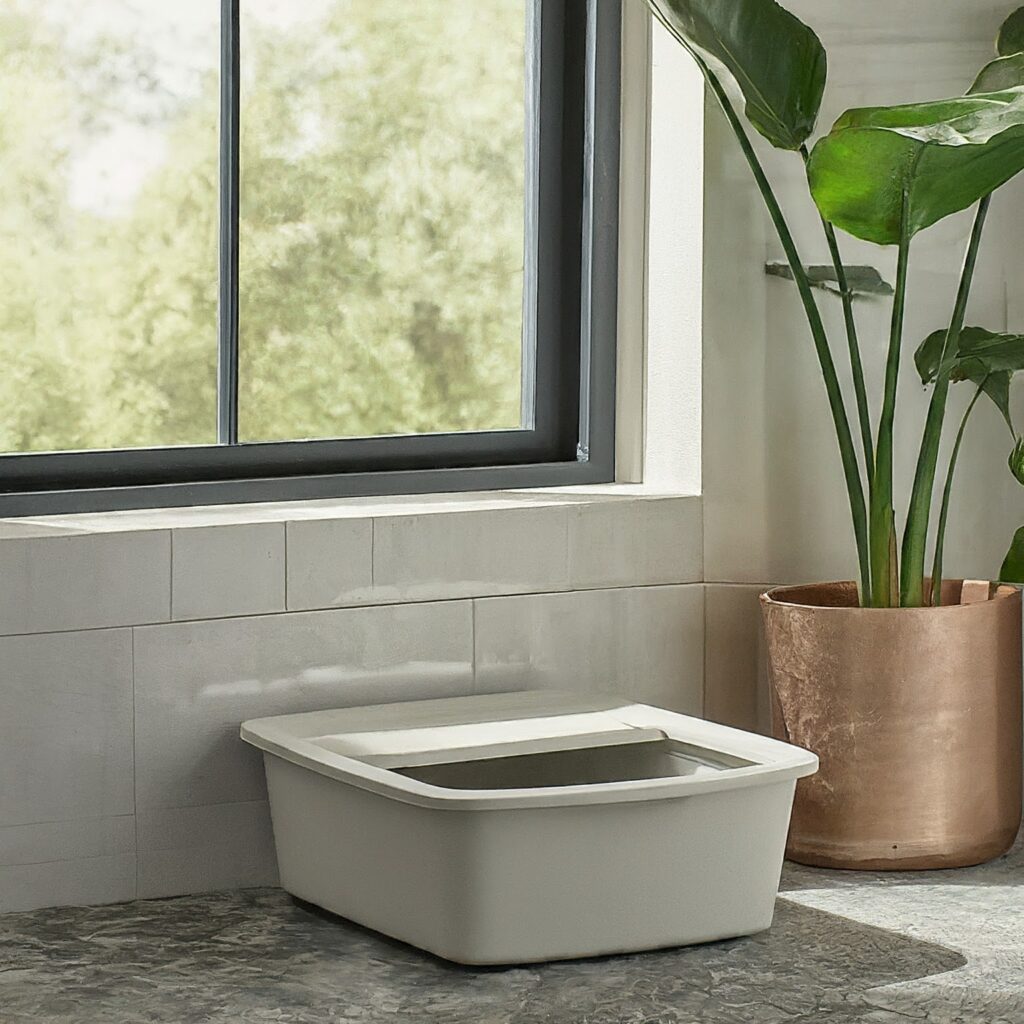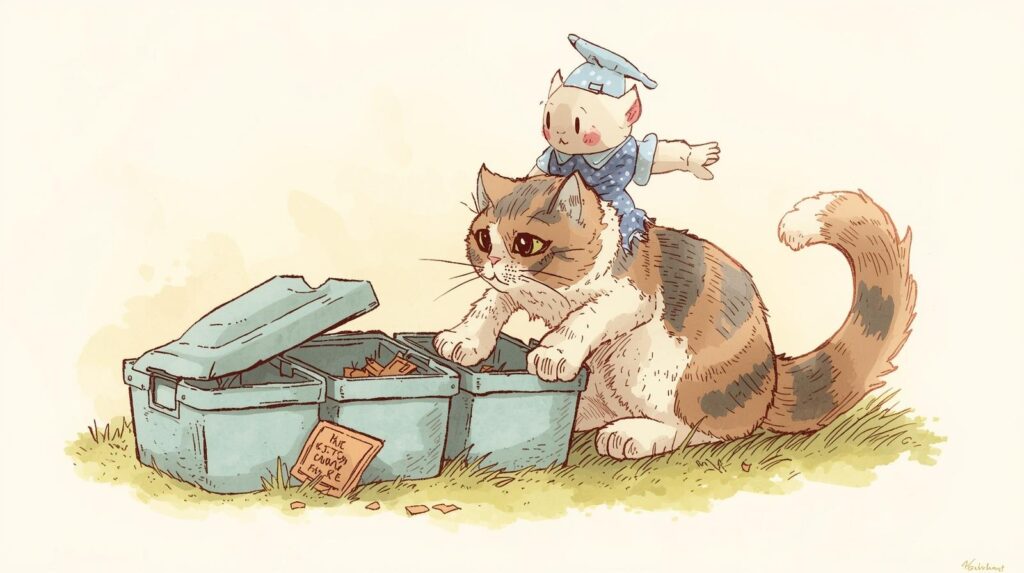
Are carnations toxic to cats? Yes, carnations are considered mildly toxic plants for cats. They contain natural compounds called saponins, which can cause stomach upset, drooling, vomiting, or skin irritation if your cat eats or touches them. While carnations are not as dangerous as lilies, they can still make your cat sick and uncomfortable.
As a caring pet parent, it’s important to know which flowers are toxic to cats and which ones are safe. In this guide, we’ll explain what happens if a cat eats a carnation, what symptoms to watch for, and the best cat-safe flowers you can bring into your home instead.
Table of Contents
What Exactly Makes Carnations Dangerous for Cats?
Carnations (Dianthus caryophyllus) look harmless, but they contain triterpenoid saponins, natural chemicals that irritate a cat’s stomach.
- What part of carnations is toxic?
The entire plant—leaves, stems, and petals—has these mild toxins. Even dried or wilted flowers can cause problems if your cat chews them.
Good news: Carnations are rarely fatal to cats. However, they can still lead to messy and uncomfortable symptoms.
What Happens if a Cat Eats a Carnation?
Cats are naturally curious, and many love to chew on plants and flowers. If your cat takes a bite of a carnation, you may start noticing changes within a few hours. Since carnations contain saponins, these chemicals irritate the stomach and skin. The reaction depends on how much your cat eats and whether they chewed petals, stems, or leaves.
Common Symptoms You May Notice
- Drooling – Cats often drool right after chewing toxic plants.
- Vomiting or Diarrhea – The body tries to push out the toxins quickly.
- Loss of Appetite – Your cat may refuse food until their stomach settles.
- Lethargy – Mild tiredness or weakness can happen after nausea.
- Skin Irritation – If plant sap touches the fur or skin, it may cause redness or itching.
Most of these symptoms are mild and temporary. Cats usually recover within 12–24 hours if they only ate a small piece.
When to Worry
While carnations are not deadly like lilies, you should watch closely. Call your veterinarian if:
- Vomiting or diarrhea lasts more than 24 hours.
- Your cat becomes very weak or dehydrated.
- You notice blood in vomit or stool.
- Your cat refuses to eat or drink completely.
In rare cases, large amounts of carnations can cause stronger stomach upset and may require vet treatment such as IV fluids or anti-nausea medication.
Why Cats Chew on Flowers
It helps to understand why your cat ate the flower in the first place:
- Curiosity – Cats love exploring new scents and textures.
- Boredom – Indoor cats may chew plants if they don’t have enough stimulation.
- Fiber craving – Some cats eat plants to help with digestion or hairballs.
Providing cat grass or safe alternatives can reduce the risk of your pet chewing toxic flowers.
Quick Tip for Pet Parents
If you catch your cat eating a carnation:
- Gently remove the petals or stems from their mouth.
- Offer fresh water right away.
- Keep the flower out of reach so it doesn’t happen again.
- Monitor your cat for at least 24 hours.
So, what happens if a cat eats a carnation? In most cases, only mild sickness. But since every cat’s body reacts differently, it’s always safest to treat carnations as toxic plants for cats and keep them out of your home.
Can Cats Touch Carnations Without Eating Them?
Many pet parents wonder if it’s safe for cats to simply brush against carnations without chewing them. The truth is, even touching carnations can sometimes cause problems. While the biggest risk comes from eating the flower, the plant’s sap and oils can irritate a cat’s skin or fur.
What Can Happen if a Cat Touches Carnations?
If your cat only brushes against the petals or leaves, here’s what you might notice:
- Skin Irritation – Redness, itching, or rashes may appear on areas where the plant rubbed against the skin.
- Eye Irritation – If the sap gets into the eyes, it may cause watering, pawing at the face, or mild swelling.
- Accidental Ingestion – Cats groom themselves by licking their fur. So, if the carnation’s sap sticks to their coat or paws, they may end up swallowing toxins while cleaning.
This means that even if your cat doesn’t directly eat a carnation, contact with the flower still poses a toxic plant risk.
Why Touching Is Still Risky
Cats are very sensitive compared to humans. Their skin absorbs plant oils more easily, and because they lick themselves constantly, there’s almost always a chance of accidental poisoning.
For example:
- Cat brushes against the carnation vase.
- Sap sticks to the fur.
- Cat later licks the same spot while grooming.
- Toxins enter the stomach → mild nausea, vomiting, or drooling.
Safe Practices for Cat Owners
If you keep carnations at home, here’s how to reduce the risk:
- Place carnations in rooms your cat cannot access.
- Use cat deterrent sprays around flower arrangements.
- Choose cat-safe flowers like orchids, sunflowers, or roses instead.
- Keep a close watch—cats are excellent jumpers and can reach high places easily.
Are Carnations Safe Around Cats in Your Home?

Bringing fresh flowers into your home can brighten any space, but if you’re a cat parent, safety always comes first. Many people ask: “Are carnations safe around cats?” The short answer is no—carnations are considered mildly toxic to cats. While they may not be as deadly as lilies, they can still cause health issues you don’t want your furry friend to suffer from.
Why Carnations Aren’t the Safest Choice
- Toxic Properties – Carnations contain compounds that can upset a cat’s stomach and irritate the skin.
- High Curiosity Factor – Cats are naturally drawn to flowers because of their smell, color, and movement. Even if you think your bouquet is out of reach, your cat may find a way to nibble or paw at it.
- Hidden Risks – Sometimes it’s not just the flower. Carnation water in vases can also carry toxins, especially if the stems release chemicals into the water. Cats that drink from the vase may ingest these toxins too.
Common Problems If Carnations Are in Your Home
If you keep carnations in your home and your cat interacts with them, here’s what might happen:
- Vomiting or diarrhea after nibbling petals or leaves.
- Drooling or lip smacking due to mouth irritation.
- Skin rashes if your cat brushes against the flowers.
- Lethargy and loss of appetite if toxins affect the stomach.
Even though these symptoms are usually mild compared to other toxic plants, they can still make your cat very uncomfortable and may require a vet visit.
When Carnations Might Be Less Dangerous
Some people argue that carnations are only mildly toxic, so having a small vase far out of reach may be “okay.” But here’s the problem:
- Cats are excellent jumpers.
- They can climb onto shelves, tables, and counters.
- Even a tiny piece of petal can cause sickness.
So, while carnations aren’t as deadly as lilies or tulips, they still aren’t truly safe around cats in your home.
Carnations vs Other Flowers: Which Ones Are More Toxic?

When asking “Are carnations toxic to cats?”, most cat owners also want to know how dangerous they are compared to other popular flowers. The truth is, carnations fall into the category of mildly toxic plants. That means they can upset your cat’s stomach, but they’re usually not life-threatening.
However, some flowers are far more dangerous. Let’s break it down.
Carnations (Mildly Toxic)
- Cause: Stomach upset, vomiting, drooling, and mild skin irritation.
- Danger Level: Mild compared to other toxic plants.
- Risk: More uncomfortable than fatal, but still unsafe.
Roses (Safe, with caution)
- Are carnations or roses poisonous to cats? Carnations = Yes (toxic), Roses = No (non-toxic).
- However, rose thorns can injure your cat if chewed or pawed.
- Many cat parents choose roses as a safer alternative to carnations.
Lilies (Extremely Toxic)
- One of the most dangerous flowers for cats.
- Even a small lick of lily pollen, leaves, or vase water can cause kidney failure.
- Unlike carnations, lilies are often fatal without emergency vet care.
Tulips (Moderately Toxic)
- Contain toxins that can cause vomiting, diarrhea, and depression in cats.
- The bulbs are especially harmful if dug up and chewed.
- More dangerous than carnations, but not as deadly as lilies.
Sunflowers (Safe for Cats)
- Non-toxic and cheerful.
- If your cat chews sunflower petals, it might cause mild stomach upset simply due to fiber, not toxins.
- A great safe alternative to carnations.
Orchids (Completely Safe)
- All orchid species are non-toxic to cats.
- Safe for decorating your home without risk.
Recommended products are carnations toxic to cats
- Cat-safe indoor plants
Brighten your home safely with cat-safe indoor plants that add greenery without harming your furry friend. Perfect for pet parents who want beauty and peace of mind.
2. Pet-safe air purifiers
Pet-safe air purifiers help remove dander, odors, and allergens from the air while keeping your furry friends safe. Perfect for a fresher, healthier home.
3. Cat deterrent sprays
Cat deterrent sprays safely keep curious cats away from plants, furniture, or flowers using harmless scents they dislike. A simple way to protect your home and your pets.
4. Cat Health Supplements
Cat health supplements support your pet’s overall wellness by boosting immunity, improving digestion, and keeping skin and coat healthy.
5. Educational & Awareness Products
FAQs about are carnations toxic to cats
Are roses toxic to cats?
No, roses are not toxic to cats. They are considered safe, but the thorns can injure a cat’s mouth or paws if chewed. Always remove thorns before bringing roses indoors.
Are carnations toxic to dogs?
Yes, carnations are also toxic to dogs. If eaten, they can cause vomiting, drooling, and mild skin irritation. While not usually fatal, vet care may be needed.
Are carnations toxic to humans?
Carnations are generally safe for humans, but eating large amounts may cause mild stomach upset or skin irritation in sensitive people. Cats and dogs, however, are more at risk.
Are carnations toxic to cats and dogs?
Yes, carnations are toxic to both cats and dogs. While not as deadly as lilies, they still cause stomach upset, drooling, and irritation. Keep them out of reach of pets.
What flowers are safe for cats?
Safe flowers for cats include roses (thorn-free), orchids, sunflowers, gerbera daisies, and zinnias. These add beauty to your home without putting your pet at risk.
Further reading
How fast can maggots kill a cat naturally
Clumping vs non-clumping litter
Wrapping Up: Are Carnations Toxic to Cats?
So, are carnations toxic to cats? Yes—they are considered mildly toxic and can cause stomach upset, vomiting, drooling, and skin irritation. While carnations are not as deadly as lilies or chrysanthemums, they still pose enough risk to make them unsafe in a pet-friendly home. Even simple contact can be dangerous since cats may groom themselves and accidentally swallow toxins.


